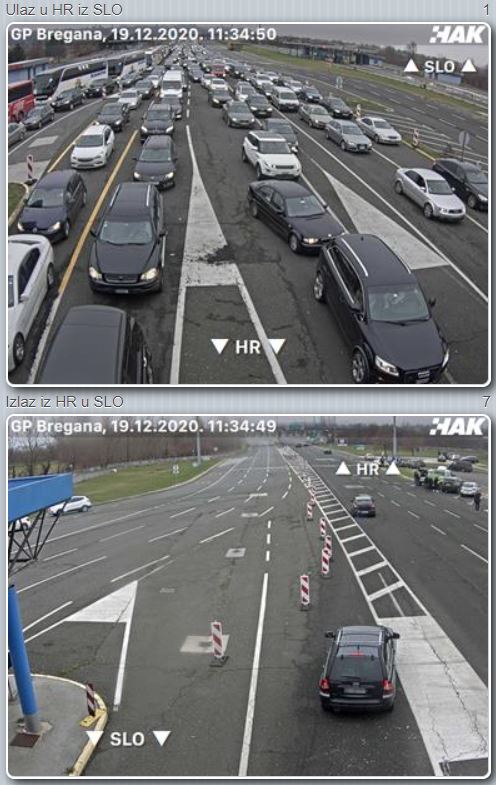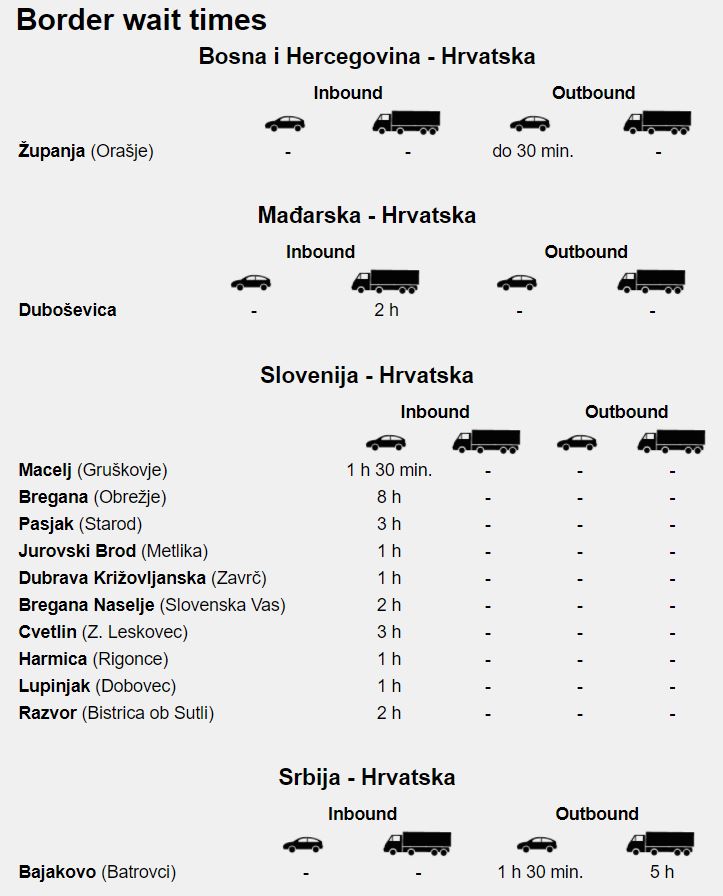Croatia’s Border Disputes with Neighbours in Light of Schengen Entry
December 14, 2022 - As the day of the Croatian entry into Schengen area approaches, we take another look at the border disputes Croatia has with its neighbours.
(This is an updated article from the original back in 2016)
The total length of the land borders of Croatia is 2,370 km, and all of those borders will experience a change on January 1st, when Croatia joins Schengen: the borders to Slovenia (659 km) and Hungary (355 km) have been the outside borders of the Schengen area until now, and will become much less important now as Croatia joins the Agreement and all border controls within the Area are abolished. The borders to Croatia's other neighbors, the longest one to Bosnia and Herzegovina (1011 km) as well as to Serbia (326 km) and Montenegro (20 km) are set to become the outside borders of the Schengen area.
Among many problems which burden relations between republics of former Yugoslavia, one of the main issues are numerous border disputes which are a consequence of the fact that Yugoslavia, while having strictly defined borders with other countries, did not have precisely marked or defined borders among its constituent parts. That fact explains why Croatian relationship with Hungary is not burdened by yet another problem, unless you count the current Hungarian Prime Minister recently claiming most of the Croatian territory.
While the disputed areas between the former republics are usually relatively small, they represent a major headache for governments of now independent states, since they are under pressure from the media and voters not to compromise and “give away” an inch of supposedly their territory.
Slovenia
Border disputes with Slovenia and Croatia are certainly the most well-known of all. Not only do they burden the bilateral relations, but they even delayed the entry of Croatia in the European Union. The most important part of the dispute concerns the border at sea. At issue is whether the border should follow the middle line between Croatian and Slovenian coast (which would mean that Slovenian sea would border just Italy and Croatia), or should be drawn in a way which would allow Slovenia to reach international waters. The dispute has been unsolved since early 1990s, with occasional incidents at sea between police and fishermen’s boats. There were repeated attempts by the two governments to come to an agreement, but they would inevitably be impeded by pressure from the media and public against any compromise.
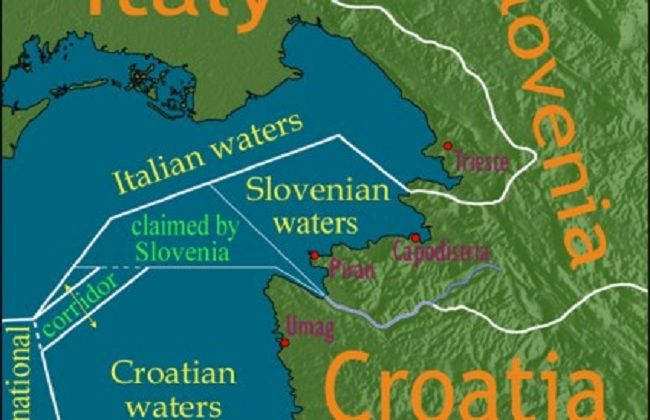
Slovenia knew that the best time for an agreement to be reached was during Croatia’s accession negotiations with the European Union. Since Slovenia had entered the EU earlier, it was able to blackmail Croatia and that is exactly what it did in 2008 when it blocked the negotiations. The move caused a complete breakdown in relations, with Croatia accusing Slovenia of hostile behaviour. After Ivo Sanader, Croatian Prime Minister at the time resigned in July 2009, new Prime Minister Jadranka Kosor prioritised the unblocking of negotiations. Later that year, Kosor reached an agreement with Slovenian government that negotiations would continue and that the border dispute would be decided by arbitration proceedings. In return, Slovenia unblocked the negotiations and Croatia became a member of the European Union in 2013.
After that, there was an entire international scandal during the arbitration process, in which the media published evidence of collusion between a supposedly independent arbiter and Slovenian Foreign Ministry, which led to Croatia dropping out of the arbitration process completely. The arbitration concluded in 2017 with a win for Slovenia, and Croatia still not acknowledging that decision as binding.
And that's more or less where we stand today still. Once the decision of Croatia's entry into Schengen was announced, both Croatia and Slovenia issued their reaction to their border dispute, and it seems the disputes are here to stay. Both Croatia and Slovenia issued one-sided statements upon the confirmation of the decision, both standing firmly at their previous stances.
There are several disputed sections of the land border as well, with the one in Istria being very important since the endpoint of the land border will influence the sea border as well. River Dragonja in Istria used to be a border, but when an artificial channel was made about 500 metres in Croatian territory in order to control flooding decades ago, Slovenia decided that this was now Dragonja and that the border should be there.
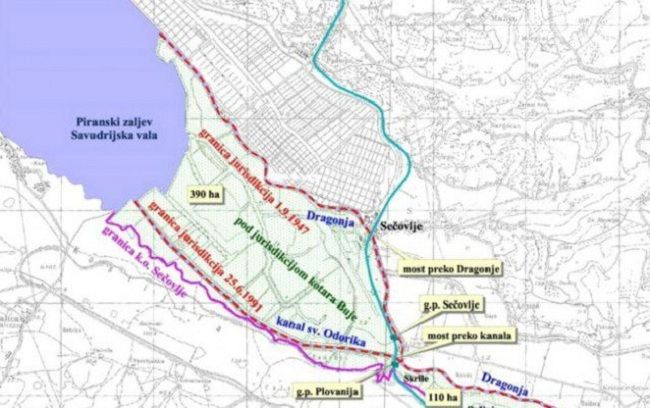
Another point of contention is Sveta Gera peak in Žumberak hills. Actually, even Slovenia more or less accepts that the peak itself and a military installation which is located there belong to Croatia, but that has not prevent its army from “occupying” the facility for the last 25 years. This was the first major border dispute between the two countries, but in recent years it has been somewhat overshadowed by the sea border issue. There are also several other sections of the land border that both countries claim for themselves.
Bosnia and Herzegovina
Compared to Slovenia, the border disputes with Bosnia and Herzegovina seem insignificant, but listening to some politicians in the past, you could get the impression that it was the most important thing in the world.
The entire disputed area is around Neum, Pelješac Peninsula and, obviously, the Pelješac Bridge, whose exact location was one of the reasons so many unimportant problems kept being brought up. The first is the small Klek peninsula, rather, its very tip, which Croatia has claimed as theirs for a while, together with two small islands next to it, Veliki Školj and Mali Školj. Both islands are uninhabited and too small to serve any useful purpose, but Croatia insisted that it should have control over them. While Croatia has hundreds of similar islands in its part of the Adriatic Sea, Bosnia and Herzegovina has a very short coast around Neum, and these two islands would virtually be the only ones it would have, so they have great symbolic importance for it as a supposedly “maritime” country. Another disputed area is a part of the border near Hrvatska and Bosanska Kostajnica, where at issue is a small castle currently controlled by Croatia, with both countries claiming it as theirs.
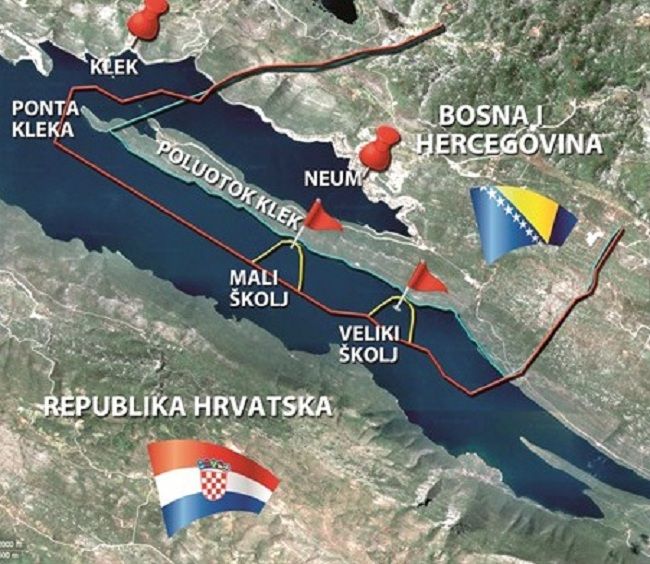
In the late 1990s, then presidents of the two countries, Franjo Tuđman and Alija Izetbegović, signed an agreement on the border demarcation, which provided for the disputed area at Neum to be given to Bosnia. However, the Croatian Parliament never ratified the agreement, claiming that a mistake was made by experts who were working on maps which are part of the agreement. Interestingly, then Croatian President Tuđman was never accused by “patriots” of being a traitor for signing such an agreement, as opposed to Prime Minister Račan, who in early 2000s tried to solve border problems with Slovenia by almost coming to an agreement with Slovenian Prime Minister Janez Drnovšek and who is still being blamed for all the border problems with Slovenia (any many other things). Luckily, these days, with the project of Pelješac Bridge finished in spite of the opposition by (some) Bosnian politicians, nobody is really talking about the tip of Klek or the small islands any more.
Montenegro
Montenegro is the smallest of all of Croatia’s neighbouring countries and its part of the border is the shortest one, so it is understandable that there is just one disputed area. It again concerns sea border, at the Prevlaka peninsula, which is with its Oštra Cape the southernmost tip of Croatia. In 2002, Croatia and Montenegro signed an agreement on temporary border regime. There have been no major incidents since, but it has still not been defined whether the temporary line will be turned into a permanent one. There were some disputes between the two countries when both of them announced tenders for oil and gas exploration in the area, with both countries claiming that the other one had no right to publish such tenders, but tensions soon calmed down.
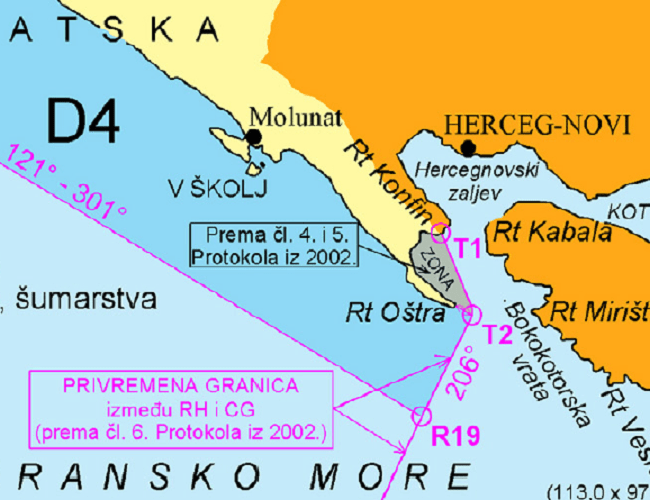
Serbia
Every list of Croatia’s problems has to include Serbia, and this one is no exception. If you think that the fact that the border between them is in a large part defined by the Danube, one of major European rivers, would make it easy to know where the border is, you would be wrong. The Danube has an unfortunate habit of changing its course, which leaves an open question of whether the border moves with it or not. Croatia claims that the border should follow an old course of the river, while Serbia wants the border to follow the middle of the current course.
According to Croatian proposal, both countries would have significant parts of territory on the “wrong” side of the river. While a perhaps logical solution would be for the two countries to exchange these pieces of land, the problem is that Croatia has about 10,000 hectares of land on the Serbian side of the Danube, while Serbia has just 1,000 hectares on the Croatian side.
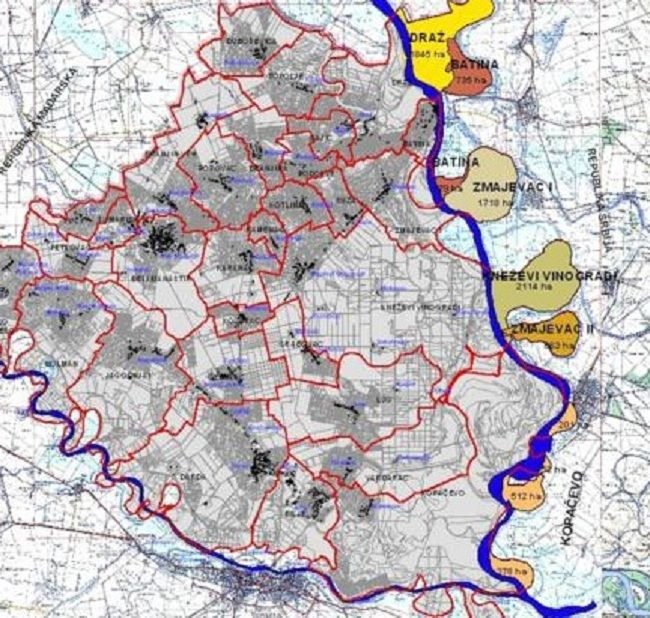
Any compromise about borders is difficult, but when it comes to the border with Serbia, it is absolutely impossible that any Croatian politician would survive giving an inch of territory. Since the border area was occupied during the Homeland War and was only returned to Croatian jurisdiction after seven years, in 1998, the pressure from the public and the media would be impossible to resist. And, while “our people have bled for this land” argument is being used against compromise for all the disputed territories, in the Danube area that is literally true, making any compromise virtually unattainable.
The border on the Danube does not involve just the territory on the other side of the river, but also the issue of small pieces of land in the middle. And that leads us to Croatia’s final border “dispute”.
Liberland (?)
While border disputes usually involve two or more countries claiming that the same piece of land or sea belongs to them, due to peculiarities of the border dispute on the Danube, there are several areas which Croatia claims belong to Serbia, and Serbia claims belong to Croatia. One such area is Gornja Siga, a 7-square kilometre large uninhabited area on the Croatian side of the river. In 2015, Czech libertarian politician and activist Vit Jedlička proclaimed “the Free Republic of Liberland” there, saying that, since both countries claim that they do not want the territory, it was “terra nullius” and could be claimed for a new state.
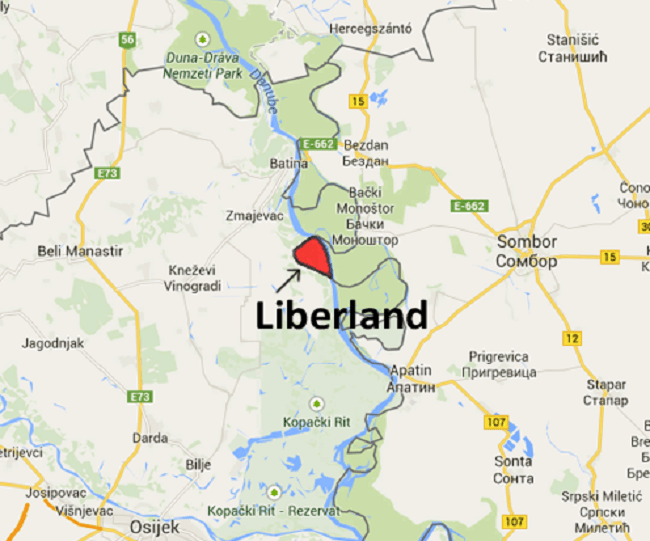
Reactions from Croatia and Serbia were different. Serbia announced that, although it considered the whole affair to be a trivial matter, the “new state” did not impinge upon the Serbian border, which it believes should be on the Danube river. Croatia, which currently administers the land in question, has stated that, after the resolution of the border dispute, the territory will be awarded to either Croatia or Serbia and therefore cannot be considered as “terra nullius”.
People coming to the island, including “President” Jedlička, have been occasionally arrested by Croatian police, which appears confused whether people should be arrested when coming from Croatian or from Serbian side of the river. Croatian courts first ruled that it was forbidden to cross from Serbia to Liberland, but then realized that they were actually confirming that the area was not part of Serbia, which was precisely what Serbia wanted. In later verdicts, courts ruled that it was forbidden to enter Liberland from Croatia. In recent years, it seems that everyone's interest in the stunt has subsided, probably around the time when the Liberland government announced that they would be issuing their own cryptocurrency. In light of the newest developments, with Croatia getting rid of any border controls with Hungary, it would be interesting to see what would happen if "President" Jedlička or some of his supporters decided to take a river boat from anywhere within Schengen and come to the island following the Danube, thus not entering from Croatia nor from Serbia.
FM: Solution is Being Sought to Facilitate Position of Croat and Slovenian Fishermen
4 April 2022 - Croatian Foreign Minister Gordan Grlić Radman said on Monday that he could not confirm that a joint fishing zone had been agreed by Croatia and Slovenia but that he could confirm that they found "agreement on enhancing cooperation with a positive outcome".
After a trilateral meeting which he held with his counterparts, Anže Logar of Slovenia and Luigi Di Maio of Italy, in Zaprešić, west of Zagreb, Grlić Radman said that Croatia and Slovenia were trying to find "a model that will include everybody, both Slovenian and Croatian fishermen."
"I think we are on the right course."
Both Grlić Radman and Slovenia's minister Logar agree that it is necessary to find a solution that will make it easier for local fishermen to do business in Savudrijska Vala Bay that is in Piran Bay.
Last Monday, Croatia's Prime Minister Andrej Plenković and his Slovenian counterpart Janez Janša discussed this topic and after their meeting in Zagreb, Plenković announced a transitional solution.
According to the Slovenian media reports, Slovenian fishermen and Opposition politicians seemed to be against a transitional solution that will include the establishment of a joint fisheries zone in the bay.
The two PMs also agreed that the solution should include the annulment of fines imposed on local fishermen when they trespassed the borderline which is not yet defined.
Passengers Have To Wait 5 Hrs To Leave for Slovenia at Macelj Border Crossing
ZAGREB, 14 Aug, 2021 - Passengers leaving Croatia at the Macelj-Gruškovje border crossing with Slovenia have to wait five hours, while those leaving at other border crossings with Slovenia have to wait between one and one and a half hours, the Croatian Auto Club said on Saturday afternoon.
Passengers entering Croatia from Slovenia have to wait the longest at Brod Na Kupi, three hours, and at Pasjak, two hours.
Those entering from Bosnia and Herzegovina have to wait two hours at the Jasenovac border crossing and one hour at Stara Gradiška.
Passengers entering or leaving Croatia at the Goričan II border crossing with Hungary have to wait one hour.
Those entering Croatia from Serbia at the Bajakovo-Batrovci border crossing have to wait one hour and those leaving half an hour, as do those entering at Tovarnik-Šid.
For more on travel, follow TCN's dedicated page.
For more about Croatia, CLICK HERE.
Queues of 8 Hours at Bregana Border Entering Croatia from Slovenia
December 19, 2020 - With the festive season almost here, huge queues appear on Croatia's borders, with the current wait at the main Bregana border now 8 hours.
I haven't left the house for over two weeks, and the more I look at the big bad world out there, the less I want to leave the sofa any time soon.
With many things closed due to the pandemic, and inter-county restrictions coming at midnight on Tuesday, there is less incentive to move anyway. But there are plenty of people with plans to head home for Christmas to family in Croatia, and perhaps an even larger number needing to transit through Croatia to get to their home countries in time for Christmas.
And the pressure is building on Croatia's bordes, particularly at the main Bregana border between Croatia and Slovenia, where the current waiting time to come info Croatia is 8 hours, according to HAK. Traffic in the other direction is minimal.
"Procedures are a bit stricter in both Croatia and Slovenia, after the decision and each passenger must be registered and checked whether they meet the conditions of entry or transit to the Republic of Croatia. By 6 pm on Friday more than 9000 passengers crossed, and we expect even more crowds over the weekend and next week on the eve of the holidays ", said Marijan Burić, Assistant Chief for State Border Protection, as a guest on RTL Danas.
"However, the turnover is significantly lower, by 70 percent compared to last year if we look at the entire 12 months, and these days it has decreased by 35 to 40 percent compared to last year," said Buric.
You can see the current waiting times at Croatia's borders, information which is regularly updated by HAK here, and you are advised to check the latest situation before you travel.
For the latest travel info, bookmark our main travel info article, which is updated daily.
Read the Croatian Travel Update in your language - now available in 24 languages.
Join the Total Croatia Travel INFO Viber community.
Who Can Cross the Croatia Slovenia Border? Who Cannot? A May 17, 2020 Border Visit
May 17, 2020 - In the absence of clear travel information, TCN visits the Croatia Slovenia border to find who is - and who is not - allowed to cross the border into Croatia. It was an illuminating visit.
Are Croatia's borders open or not? If yes, who can cross them, and under what circumstances? With so many tourists wanting to come, can they jump in the car and come?
After Croatia led the world in clear communication on the health aspects of the corona threat, that clarity seems a distant memory. Stories of foreign tourists entering the country are flooding the media, and it seems that the season is starting. But is it?
Here is the official COVID-19 page from the Ministry of Tourism which one would hope would provide the answer. If you can find it, you are a better man than me.
According to the Croatian National Tourist Board recently revamped travel info page, all the answers can be found at a very helpful email address. Insider tip - good luck with that one from personal experience.
Here is some useful info from Croatian Roads (HAK), but with all those specific questions resting on the Ministry of Tourism responding to an email.
I am still trying to find out the actual procedure for crossing the border. As my colleague patiently waited for the email reply (now Day 4), I concluded that there was nothing better than finding out from personal experience.
Why not go to the Croatia Slovenia border myself and see what is happening. As these are sensitive times, I contacted the Ministry of the Interior of both Croatia and Slovenia, stating my intentions and asking for their assistance.
Croatia 1, Slovenia 0.
I received an automated response from the Slovenians the next day (in Slovenian). I have heard nothing since. From the Croatian side, I received this:
Dear Sir,
we agree with the recording at the said border crossing, without statements from police officers and other officials.
Please comply with the Law on State Border Surveillance, follow the instructions of police officers and keep your stay at the border crossing to a minimum.
The same is necessary for the smooth implementation of measures and actions carried out at the border crossing.
We also confirm that we have received your inquiry sent to us on 15th of May 2020., and we inform you that we will send you an answer when we gather all the necessary information.
Best regards,
There are three border crossings just outside Zagreb around Bregana, and I decided to visit all three, the two small ones first.
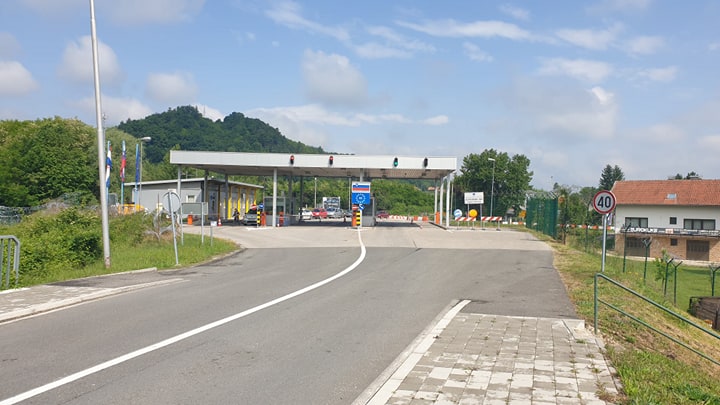
The first was quiet, with just a few cars coming from the Slovenian side. The Croatian border official was polite and let me proceed to her Slovenian colleague, who declined to answer questions as I didn't have a Slovenian official approval.
There were a couple of Slovenian bikers who were happy to talk to me. This was not their first time across the border. They had a business in the next village, all the appropriate paperwork, so the crossing was problem-free. Get the necessary paperwork, an invitation from a Croatian business, for example, and all is fine.
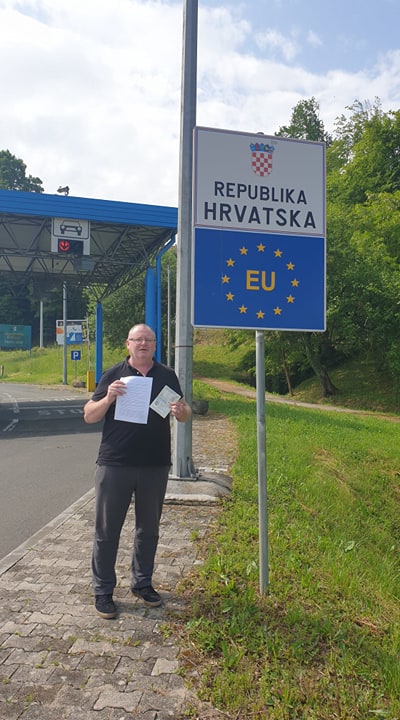
I was planning to film a video report but I now how sensitive the police are about filming at borders. Ok, true story - I left my phone charger in Dugopolje and my phone died.
I did get a copy of the recommendations (and in English!) for each tourist arriving. You can see the advice at the bottom of this article.
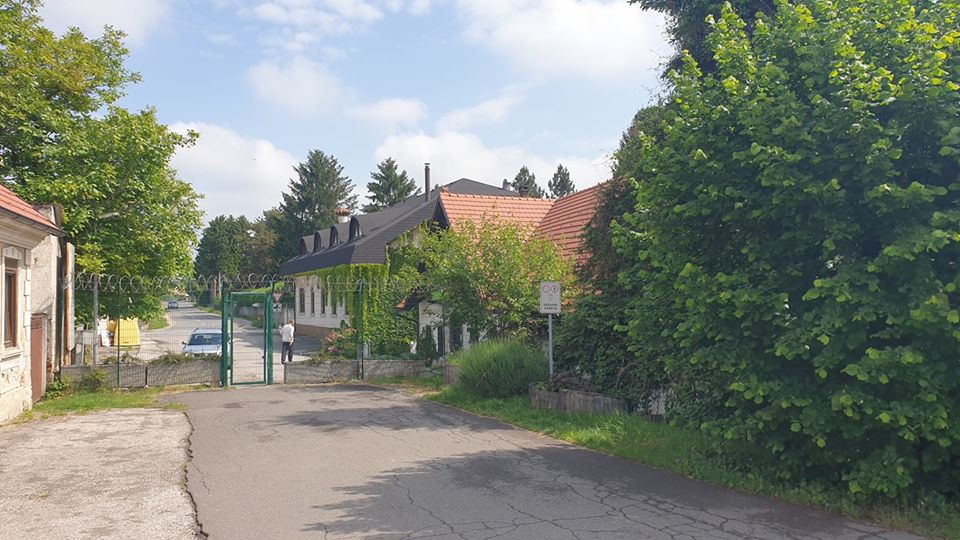
Next up, the best Croatia Slovenia border of them all (if you really want to research the subject, here is the Total Croatia guide to crossing the Croatia Slovenia border in normal times).
Before the migrant crisis, this border had one of the coolest border restaurants ever - the bar was in one country, the toilets in the other. Imagine having to leave the Schengen zone to pee!
The restaurant is now closed for normal service, but it does still service groups, the owner told us through the gate today. But the erection of the wire and gate during the migrant crisis killed all business. The border is normally open from 0600 - 2300, but has been closed these past few weeks - and remains so.
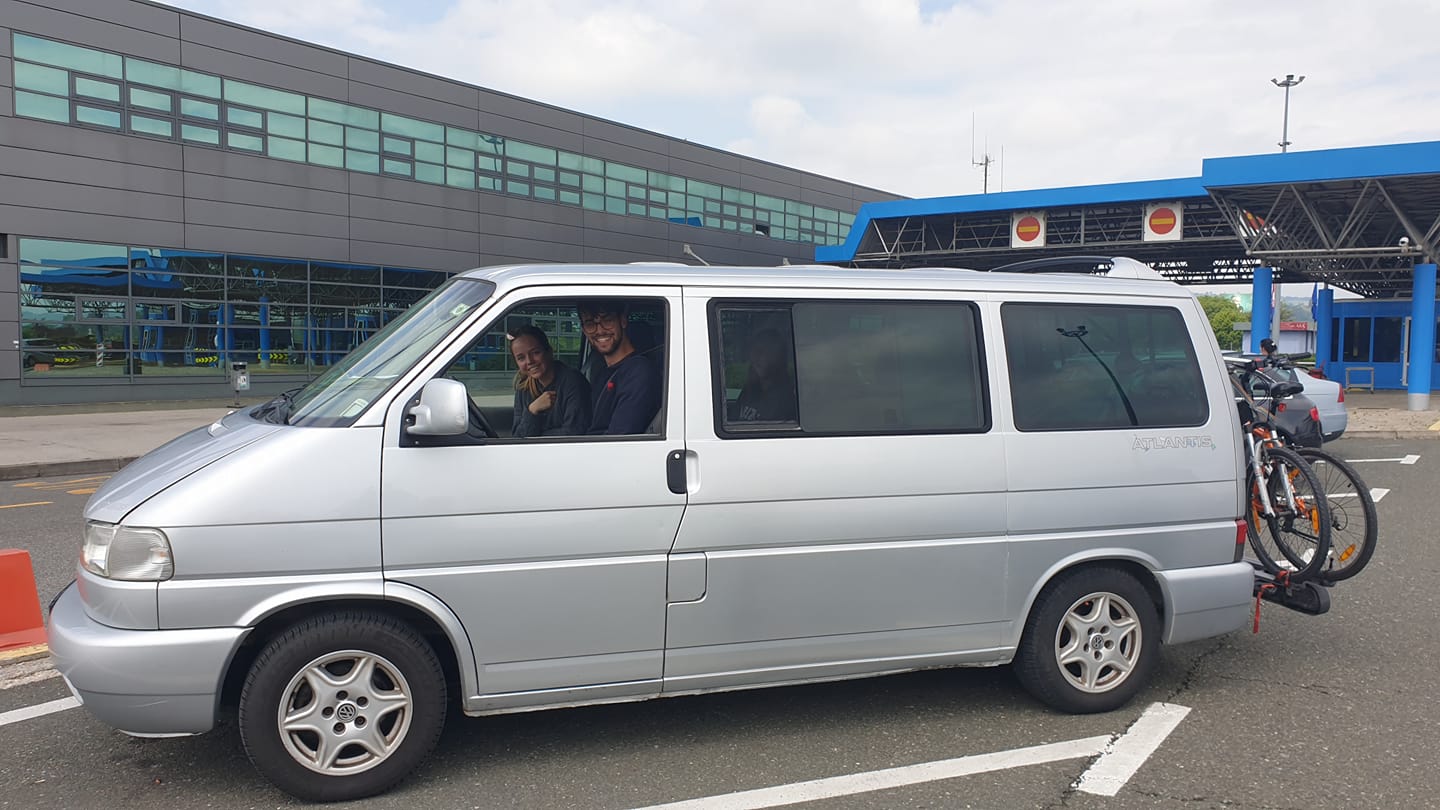
I introduced myself to the Croatian police, who were very polite, helpful and efficient. My documents checked, I was free to observe and to talk to people travelling both ways. I really liked thes happy Slovenians, who had been following the local news and got everything in place regarding paperwork. They were off to a campsite on Krk where their family had a property, and they made sure they had an official invitation, with a stamp for good measure.
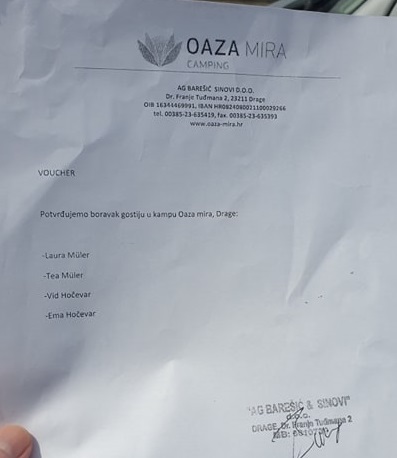
Now that the borders in Slovenia are open, they did not have to worry about self-isolation on return. This is an issue which people are asking about. Until I get official answers, all I can say is talk to your embassy about the latest info, both incoming to Croatia and when you return home. They will have the best (and official) info.
There were lots of foreign plates, mostly German, but few foreigners. The Croatian diaspora returning home from Germany, Austria, Holland. A Montenegrin living in Munich, who has been going back and forth for weeks.
Processing time was about 5 minutes per car, but this was the process that reassured me. For the word in Croatia is that the borders are open, which is great news for tourism. But it would be highly irresponsible to simply let everyone in without knowing where they are going.
And not everyone is getting in.
Currently, you can pass the border as an EU citizen if you have an official business invite, own real estate, or can prove a tourism reservation in a hotel or similar.
And if you can't, you don't come in.
The idea, I realised, is the ability to control the information in case of trouble.
The transit process (and PLEASE note, this is just the Croatian border, I did not get permission for the Slovenian one, is that you can rock up at the border, show your ID and certified reservation or business invite, or real estate papers, and be allowed in. They will want to know how long you will stay, address and your contact details, as well as physically showing your invitation. The registration process is a swipe of your ID, but then the time-consuming process of manually adding details of your invitation, contact details etc. Necessary but time-consuming.
By controlling the whereabouts of tourists who enter, it seems, this is how Croatia will control the corona threat. And not everyone gets in...
My favourite moment was the pre-crossing chat with a Slovenian guy from a local town. He winked and told me he was off to see his Croatian mistress for lunch and a bit of fun. Unfortunately, his illicit lover was left a little frustrated, as they both forgot to sort the official invite (presumably the wife might have found out). No entry.
Two very jolly Slovenian ladies of a certain age were thrilled to be able to get to their beloved Adriatic. They had no plans, the borders were open and they would decide where when they felt like it. No entry.
A Croat from Germany with a business meeting to attend in Zagreb. The invite consisted of an email. After a long discussion (and some phone calls), he was allowed through. Lesson learned and top recommendation - get a proper, stamped invitation. It will save time for you and all behind you, and will eliminate the risk of refusal.
And that's as much as I can tell you, as someone not part of the system.
Check before you travel, make sure you have the documentation ready, and you should be fine.
Recommendations and instructions of the Croatian Institute of Public Health.
Croatian and foreign nationals entering the Republic of Croatia must comply with these recommendations and instructions in the period of 14 days following their crossing of the state border, as follows:
During the first 14 days following the entry into the Republic of Croatia, accommodation may be left only in absolutely necessary situations:
carrying out business activities if business was the purpose of entry into the Republic of Croatia, carrying out necessary activities with continuous increased hygiene measures in place.
When leaving accommodation in absolutely necessary situations, it is recommended to wear a mask or a covering for the nose and mouth, to keep a physical distance from others (a minimum of 1.5 meters) and to practice hand hygiene.
Hands should be washed as often as possible with warm water and soap and/or a hand disinfectant should be used that needs to be well rubbed on the palms.
Touching one's face, mouth, nose and eyes should be avoided.
Using public transport should be avoided.
ln the means of transport, a person should preferably be alone or exclusively with persons with whom he/she shares accommodation.
Grouping and public gatherings should be consistently avoided.
During business meetings, it is necessary to meet with as few persons as possible, to ensure a physical distance of 1.5 meters and availability of disinfectants, to avoid unnecessary meetings.
During their stay in the accommodation, the persons concerned prepare the food themselves or use food and beverage delivery services.
Payments are made by using non-cash card payments or online services.
Body temperature should be measured every morning. lf it exceeds 37.2 degrees, it should be taken again after 10 minutes. lf the temperature again exceeds 37.2 degrees, the person should stay at home/one's accommodation and contact the chosen general practitioner,
if any (Croatian nationals), or a competent local epidemiologist.
ln case of any symptoms of acute respiratory infection (cough, sore throat, high temperature, short breath/difficulty in breathing, loss of smell and taste), it is necessary to stay at home/your accommodation and contact the chosen general practitioner, if any (Croatian nationals), or a competent local epidemiologist.
ln case of sudden onset of severe, life-threatening symptoms, the person should contact the emergency medical services.
ln case of respiratory disease symptoms.
lf you develop respiratory disease symptoms (high temperature, cough, shortness of breath, difficulty in breathing, sore throat, weakness), you should contact your chosen doctor by phone who will, based on your medical condition, assess the need for you to be tested for the new coronavirus.
lf you require medical assistance for reasons other than a respiratory disease, you should phone your chosen doctor or one of the members of your household can contact the doctor for consultations and arranging a house call.
Do not visit healthcare facilities without having previously contacted them by phone.
You can find more information on the coronavirus disease and measures for reducing the risk of spreading the disease on the website of the Croatian Institute of Public Health, or from your chosen general practitioner and a competent local epidemiologist.
Slovenian Committee Rejects Motion on Activating Troops Along Border with Croatia
ZAGREB, April 2, 2020 - The government-sponsored motion to give some of the police powers to army servicemen along the border with Croatia was turned down by the Slovenian parliament's defence committee on Wednesday evening.
For the proposal to be adopted, a two-third majority vote was necessary. However, during the vote, out of the 19 members who attended the committee's meeting in Ljubljana, 11 voted for the proposal, which was not enough to have the required two-third majority.
As a result, the motion could not be added to the agenda of the parliament.
Proposing the motion, the government led by Prime Minister Janez Janša said that the army, deployed in a five-kilometre-wide belt along the border with Croatia should be given some of the police powers in order to help relieve the burden on police officers so they can better be deployed to help keep the coronavirus epidemic in check.
More news about relations between Croatia and Slovenia can be found in the Politics section.
Slovenia to Send Army to Croatian Border
ZAGREB, March 25, 2020 - Slovenia's Interior Minister Ales Hojs on Wednesday stated that deploying Slovenia's army on the border with Croatia is essential because of illegal migration and because the police have additional duties during the current epidemiological crisis.
Activating our army to guard our southern border will be essential in the current situation with the spread of coronavirus, Hojs told a press conference in Ljubljana.
The activation of the relevant law that would give the army certain police powers and the possibility of protecting the border requires the support of two-thirds of the legislature. That is why Hojs said that he would meet with opposition caucuses over the next few days in an effort to convince them that the procedure is essential.
He said that the motion to activate the army for tasks on the border has the support of President Borut Pahor and Prime Minister Janez Janša's cabinet, so he believes that the bill will be passed with the necessary parliamentary majority, giving the army powers for a period of three months, i.e. for the duration of the coronavirus crisis.
Hojs said that deploying the army in the current situation is essential because of increased migration and the scope of work the police are involved with within the country related to the spread of COVID-19.
"We do not have any infected migrants in Slovenia yet but the number of illegal migrants caught in Slovenia at the start of the year was 70% higher than last year. There are six thousand migrants in Bosnia and Herzegovina. We do not know where they are located nor whether they are infected with coronavirus. That is why the protection of our border to the south is currently one of the government's priorities," Hojs said and added that while the coronavirus epidemic lasts, the government's main task is to protect Slovenia's citizens.
More news about relations between Croatia and Slovenia can be found in the Politics section.
Future Slovenian Foreign Minister in Favour of Strengthening Relations with Croatia
ZAGREB, March 10, 2020 - The candidate for new Slovenian foreign minister, Anže Logar, on Tuesday spoke in favour of strengthening relations with Croatia while protecting Slovenian national interests.
Speaking before the parliamentary Foreign Affairs Committee, Logar said it was positive that initiatives had been taken at the presidential level to build confidence with Croatia, while no such encouragement had come from the Ministry of Foreign Affairs as of late.
"We should closely cooperate with Croatia and support initiatives that will build mutual trust, while at the same time taking account of the need to ensure respect for international law and court rulings," Logar said while presenting his programme as the candidate of Prime Minister-designate Janez Janša for the future Minister of Foreign Affairs.
In his opinion, the present Ministry of Foreign Affairs did not maintain close contacts with Croatia and did not have a good insight into the relationship with Croatia.
"Croatia is just one of our neighbours, we have outstanding issues with it, but we will resolve them sooner or later," Logar said.
He said that Slovenia should boost parliamentary contacts with Croatia and that it would have a better insight into their relationship if it appointed a special commissioner for relations with Croatia.
Logar said that better cooperation with Croatia was also important for strategic reasons, citing illegal migration and the coronavirus outbreak, adding that there would be more challenges in the future that would require cooperation.
More news about relations between Croatia and Slovenia can be found in the Politics section.
Slovenia: Talks with Croatia Possible Only on Implementation of Border Arbitration Ruling
ZAGREB, February 3, 2020 - Slovenian Foreign Minister Miro Cerar said on Sunday that talks on the border issue with Croatia were possible but that they could only be about ways to implement the border arbitration award which Ljubljana considers binding, and that dialogue could be started by Presidents Borut Pahor and Zoran Milanović.
"Talks are necessary. They are possible but they could only be about the arbitration award, that is, ways to implement it," Cerar said in an interview with Slovenian Television.
Dialogue could start between Slovenian President Borut Pahor and Croatian President-elect Zoran Milanović after Milanović takes office, since the Slovenian government resigned last Monday and now operates only as a caretaker government.
Cerar dismissed criticism in Slovenia that he was responsible for Slovenia losing a case against Croatia before the Court of Justice of the EU in Luxembourg.
Cerar said Slovenia had sued Croatia in 2018, at the end of the term of a government that was led by him, but the lawsuit was supported by all parties making up the then ruling coalition and a large portion of parliamentary parties.
He said the lawsuit was worth the effort even though the Luxembourg-based court said it did not have jurisdiction over it.
Cerar said the lawsuit was worth the effort also because of the media statement the EU court published last Friday before publishing the integral version of its ruling. That statement, even though a sentence with the same wording was not included in the ruling itself, says that Croatia and Slovenia must implement the border arbitration ruling and that the border between them is defined, claims Cerar.
The government in Zagreb, however, has dismissed Cerar's claims as factually incorrect because Slovenian media cited only a part of the court statement.
Asked whether early parliamentary elections were possible after Prime Minister Marjan Šarec's resignation last week or a new parliamentary majority would be formed, Cerar said both options were possible.
More news about the border issue between Croatia and Slovenia can be found in the Politics section.
EU Court Says It Has No Jurisdiction over Slovenia's Action Against Croatia in Border Dispute
ZAGREB, January 31, 2020 - The Court of Justice of the European Union announced on Friday that it had no jurisdiction to rule on a Slovenian case against Croatia over alleged infringements of European law resulting from Croatia's failure to implement a border arbitration ruling, the Luxembourg-based court stated today.
The decision on non-jurisdiction means that Croatia's arguments are accepted and further proceedings cease automatically.
Rulings handed down by the Court of Justice of the European Union are final and non-appealable.
Slovenia brought the action against Croatia under Article 259 of the Treaty on the Functioning of the European Union, moving that the Court of Justice establish that Croatia is in breach of Articles 2 and 4 of the Treaty which relate to respect for the rule of law and loyal cooperation between member states. Slovenia also submits that Croatia is in breach of the regulation on the common fisheries policy, border control and maritime spatial planning.
Croatia, on the other hand, argues that the Court of Justice has no jurisdiction to rule in the present case given that it is not really about the application and interpretation of EU law. According to Croatia, the dispute in this case refers to the interpretation and application of international law and therefore it should be resolved by applying international law and by means envisaged for the peaceful resolution of disputes, including negotiations.
More news about the border dispute between Croatia and Slovenia can be found in the Politics section.


